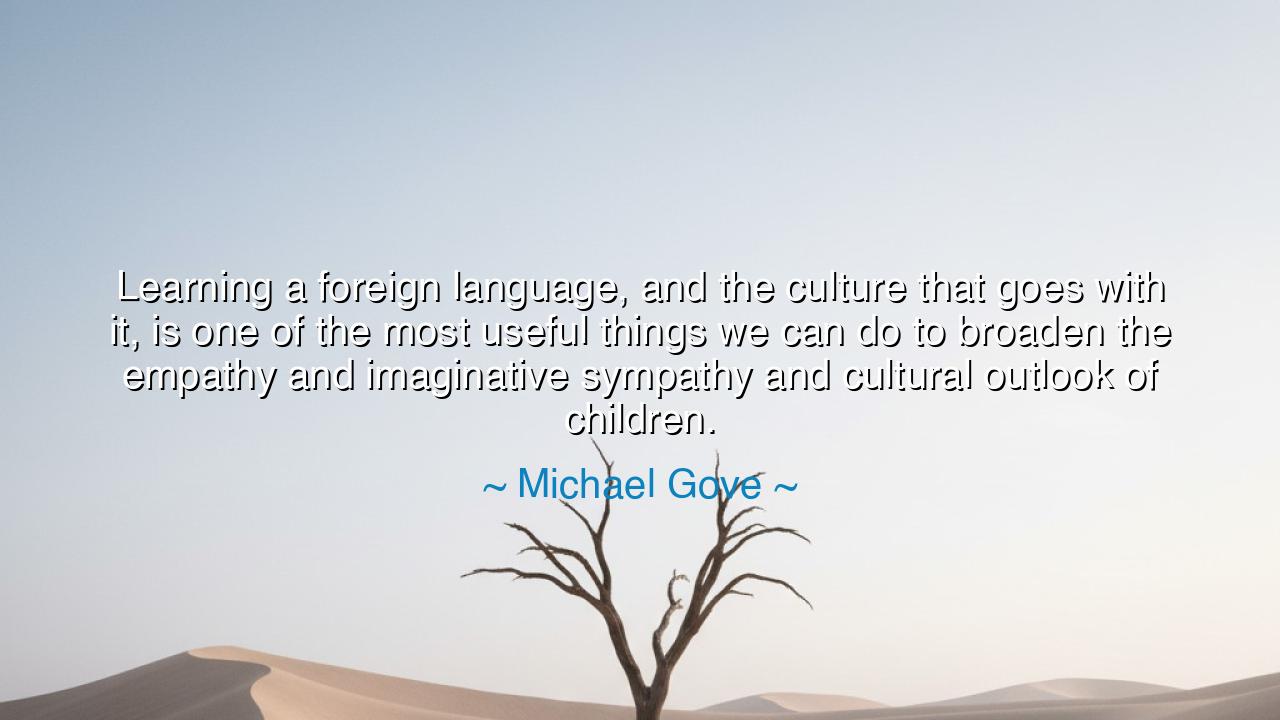
Learning a foreign language, and the culture that goes with it
Learning a foreign language, and the culture that goes with it, is one of the most useful things we can do to broaden the empathy and imaginative sympathy and cultural outlook of children.






There is a sacred magic hidden in the art of language — a power that transcends borders, dissolves fear, and awakens the soul to the vastness of humanity. In his profound words, Michael Gove reminds us: “Learning a foreign language, and the culture that goes with it, is one of the most useful things we can do to broaden the empathy and imaginative sympathy and cultural outlook of children.” In this, he speaks not merely of education, but of the awakening of the human heart. For to learn another tongue is to momentarily step out of oneself — to see the world through the eyes of another, to feel their joys, sorrows, and dreams as though they were one’s own. It is not a mere academic act; it is an act of communion.
From the earliest civilizations, the learning of languages was seen as a path to wisdom. The scholars of Alexandria translated the words of Greece and Persia to preserve the knowledge of both worlds. The monks of medieval Europe copied texts in Latin, Greek, and Arabic, bridging cultures that would otherwise have remained strangers. They knew that when one learns another’s language, one also learns their way of thinking, their rhythm of life, their poetry of being. It is the gateway through which empathy enters — for it is impossible to hate what one understands deeply. Thus, the study of language is also the study of peace.
In a world divided by walls both visible and unseen, the loss of empathy is the greatest danger. But language, like water, flows past boundaries. It reminds us that no people are alien, only unfamiliar. When a child learns another language, he learns patience; when he learns another culture, he learns humility. He begins to see that his way is not the only way, that truth is many-faced and beauty speaks in countless accents. Imaginative sympathy, as Gove calls it, is the foundation of civilization itself — for all art, all diplomacy, all love begins with the ability to imagine the soul of another.
Let us remember the story of Malala Yousafzai, who as a young girl in Pakistan learned English not to abandon her heritage, but to give voice to her struggle for education to the world. Through language, she bridged the mountains that divided her valley from the global conscience. Her courage became universal because her words could be heard beyond her borders. In her story, the wisdom of Gove’s words lives vividly: language learning expands not only the mind, but the reach of compassion.
Even the ancients knew this truth. The great conqueror Alexander of Macedon learned Persian after conquering Asia, not merely to rule, but to understand. His empire endured longer in memory than in power because it was built not only on armies but on the fusion of cultures — Greek with Egyptian, Macedonian with Indian, Eastern with Western. His dream was not domination, but unity through understanding. And unity begins always with words — spoken, shared, and learned with respect.
To teach children languages is therefore to plant the seeds of a wiser world. It teaches them to listen before they speak, to observe before they judge, to connect before they condemn. It transforms them into citizens not of a single land, but of the earth itself. The narrow mind sees difference as threat; the educated mind sees it as wonder. And what is education, if not the constant expansion of wonder?
So let this truth echo across the generations: the world will not be healed by power or wealth, but by empathy and understanding. And these are born from language — from learning how others dream, sing, mourn, and hope. Let every parent, every teacher, every leader remember this: when you teach a child a foreign tongue, you are teaching them humanity itself. You are opening the gates to the imaginative sympathy that unites all nations under one sky. For though words differ, the heart that speaks them is the same — and in learning the languages of others, we remember the universal language of love.






AAdministratorAdministrator
Welcome, honored guests. Please leave a comment, we will respond soon